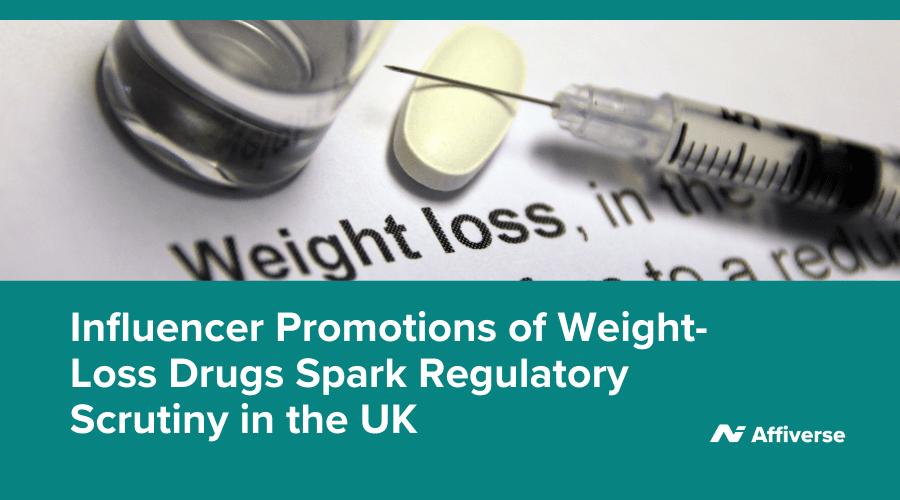Influencer Promotions of Weight-Loss Drugs Spark Regulatory Scrutiny in the UK

The rise of influencer marketing has transformed how brands connect with consumers. From beauty products to fitness gear, social media personalities have the power to influence buying decisions like never before. However, recent developments have highlighted the risks when this marketing approach crosses into regulated industries.
A London-based online pharmacy, MedExpress, has come under investigation after reports surfaced that it sought to collaborate with influencers to promote prescription-only weight-loss drugs. This move has triggered regulatory concerns over how prescription medications are marketed and the role influencers play in promoting sensitive products.
This case is a wake-up call for brands and affiliate marketers to recognise the legal and ethical boundaries of influencer marketing, especially in industries subject to strict advertising regulations.
The Issue at Hand
MedExpress allegedly approached social media influencers to help market prescription-only weight-loss drugs. This practice is strictly regulated in the UK under laws that prevent the direct-to-consumer advertising of prescription medications.
The UK’s Medicines and Healthcare products Regulatory Agency (MHRA) has clear rules stating that prescription drugs cannot be advertised to the general public. These regulations are in place to protect consumers from being misled about the safety, effectiveness, or necessity of certain medications.
By attempting to engage influencers in the promotion of prescription weight-loss drugs, MedExpress may have breached these regulations, raising serious concerns about consumer safety and marketing ethics.
The Risks of Influencer Marketing in Regulated Industries
Influencer marketing thrives on personal connection and trust. Followers view influencers as relatable and authentic, making their endorsements feel more genuine than traditional advertisements. However, when influencers promote products with health implications—such as prescription drugs—the risks become much more significant.
- Misinformation and Consumer Safety: Influencers are not medical professionals, yet their endorsements can heavily influence purchasing decisions. This can lead to misinformation about the effectiveness or safety of medical products, potentially putting consumers at risk.
- Regulatory Breaches: Industries like healthcare, finance, and gambling are heavily regulated for a reason. Brands operating in these sectors must follow strict guidelines, and failure to comply can result in legal action, fines, and reputational damage.
- Loss of Trust: Partnering with influencers to promote regulated or sensitive products can harm both the brand’s and the influencer’s reputation. Consumers may feel deceived if they believe they are being sold products that are not safe or legally marketed.
Stricter Oversight on Influencer Marketing
This situation has put a spotlight on the need for stricter oversight of influencer marketing, particularly for high-risk products. Regulatory bodies like the MHRA and the Advertising Standards Authority (ASA) are likely to increase scrutiny on how brands and influencers collaborate.
In recent years, the ASA has already taken steps to hold influencers accountable. Social media personalities must clearly disclose paid partnerships, and brands are responsible for ensuring that promotional content complies with advertising laws.
However, this case highlights a gap in enforcement when it comes to highly regulated products like prescription medication. It’s likely that regulators will introduce tighter guidelines and more frequent audits to prevent similar breaches.
What This Means for Affiliate Marketers and Brands
For affiliate marketers and brands, this case is a stark reminder that compliance must be at the core of any marketing strategy. Affiliate marketing, in particular, requires careful management to ensure that partners promote products responsibly and legally.
- Know the Regulations: Brands must fully understand the legal restrictions around their products. This is particularly crucial in sectors like healthcare, where marketing rules are far more stringent than in consumer goods.
- Vet Affiliates and Influencers Carefully: Partnering with influencers or affiliates comes with shared responsibility. Brands should thoroughly vet potential partners to ensure they understand and adhere to advertising regulations.
- Provide Clear Guidelines: Brands need to supply influencers and affiliates with clear guidelines on what they can and cannot say about products. This helps prevent accidental breaches of advertising laws.
- Monitor and Audit Campaigns: Regular monitoring of marketing campaigns ensures compliance. Brands should use tracking tools and conduct regular audits to identify any content that could pose legal risks.
The Importance of Ethical Marketing
Beyond legal compliance, brands must prioritise ethical marketing practices. The pressure to drive sales and stay ahead of competitors should never come at the expense of consumer safety.
Ethical marketing builds trust, fosters long-term customer relationships, and protects brands from damaging scandals. When marketing products that affect health and wellbeing, this responsibility becomes even more critical.
Affiliate marketers and influencers alike must remember that their influence comes with responsibility. Promoting products without fully understanding their impact can harm consumers and damage reputations.
Looking Ahead
The MedExpress case is a cautionary tale for the entire digital marketing industry. As influencer marketing continues to grow, brands and affiliates must be more vigilant than ever in understanding the legal boundaries of their promotional efforts.
Regulators are likely to tighten rules around how sensitive products are marketed online, and brands must adapt accordingly. Clear communication, rigorous compliance checks, and a commitment to ethical marketing will be key to avoiding similar issues in the future.
For affiliate marketers, this means working closely with brands to ensure all promotional activities follow legal and ethical standards. Trust and transparency are more important than ever.
In a world where marketing moves fast, slowing down to ensure compliance and responsibility is not just good practice – it’s essential for long-term success.






